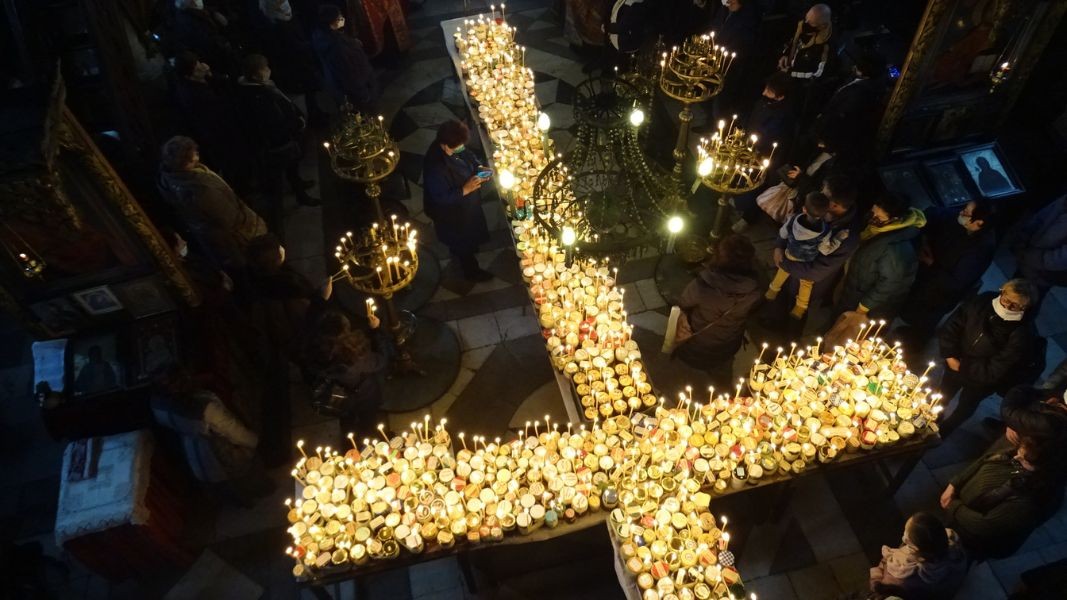
On February 10, the Bulgarian Orthodox Church honors the memory of Great Martyr Haralambos the Wonderworker who lived in the 2 century in Asia Minor. Saint Haralambos is regarded as patron saint of bees and apiarists, as since time immemorial people have relied on honey to cure all kinds of illnesses. Today, honey is sanctified in all Bulgarian Christian temples. It is believed that honey has a greater purifying and healing power when it is sanctified. Unfortunately, industrial agriculture has destroyed much of the lush meadows with blooming wildflowers and herbs. “Nature abounds in nectar. Bees use only 5% of it. The rest of the nectar is evaporated by the sun and washed away by the rain. The question is whether there are enough healthy bees to collect this nectar!” – said long-time beekeeper Georgi Georgiev who keeps bees on the outskirts of the capital city Sofia.

“Nectar is invisible to the naked eye. It is difficult to measure its quantities and beekeepers must intuitively choose the right moment to place the medium honey super. That is why beekeeping science is very specific. It requires in-depth knowledge. Beekeeping is not for everyone. I got acquainted with beekeeping when I was a student- one of my teachers took me to the local beekeeping society in my hometown of Novi Pazar. I have been actively involved in apiculture since 1987-1988. I found out that we can learn a lot from bees, because they are very hard-working. The bee colony is perfectly organized. According to researchers, bees appeared 50-150 million years ago. People think that bees sleep at this time of the year. That is not the case- now they are rearing a new generation which should be ready to start collecting nectar by March 22, when plants will be already blooming. Bees pollinate the plants which are a source of food for people and animals.”

“However, when we face so many difficulties and are unable to raise strong and healthy bee colonies, we can’t rely on beekeeping as a source of income”.
Beekeeping - an invaluable factor for health, yet not a priority sector for the Bulgarian state
Beekeepers are worried that Bulgarian honey holds the lowest purchase price in Europe
“Honey consumption should not be indiscriminate. We should regard honey as a medicine and reach for the spoon only when we are craving this product. Let us also make another point, we should hold it in our mouth for some time and imagine the following picture- trees are blossomming, everything is bathed in light, the plants abound with nectar and the bees are collecting it. We will significantly improve our health condition, if we establish a connection between the sun, the nectar, the bee and the honey”, beekeeper Georgi Georgiev contends.
The Consulate General of Bulgaria in New York is opening its doors to interns and volunteers who want to gain a realistic idea of the diplomatic profession and to join the cultural life of the Bulgarian community overseas. In order to become an..
A delightful town, Pazardzhik, lies just 37 kms. from Bulgaria’s second biggest city, Plovdiv, and about 100 kms. to the Southeast of the country’s capital Sofia. The favourable geographical location of this ancient town is the reason why important..
On June 21 the world will have a reason to unite and humble itself. We can find it in the International Day of Yoga – the ancient practice and teaching that focuses on the unity of body, mind and spirit. The United Nations officially..
Bulgaria is the country with the lowest prices of basic fuels in the EU – petrol and diesel, data show. Yet, as the date of the expected adoption of the..
A summer edition of the Farmers’ Festival, which focuses on clean food, parenting and books, will take place at the flagpoles of the National Palace of..
Students from the Vasil Aprilov Bulgarian Sunday School in Charlotte, North Carolina, USA, learned about the life and art of Vladimir Dimitrov – the..

+359 2 9336 661
